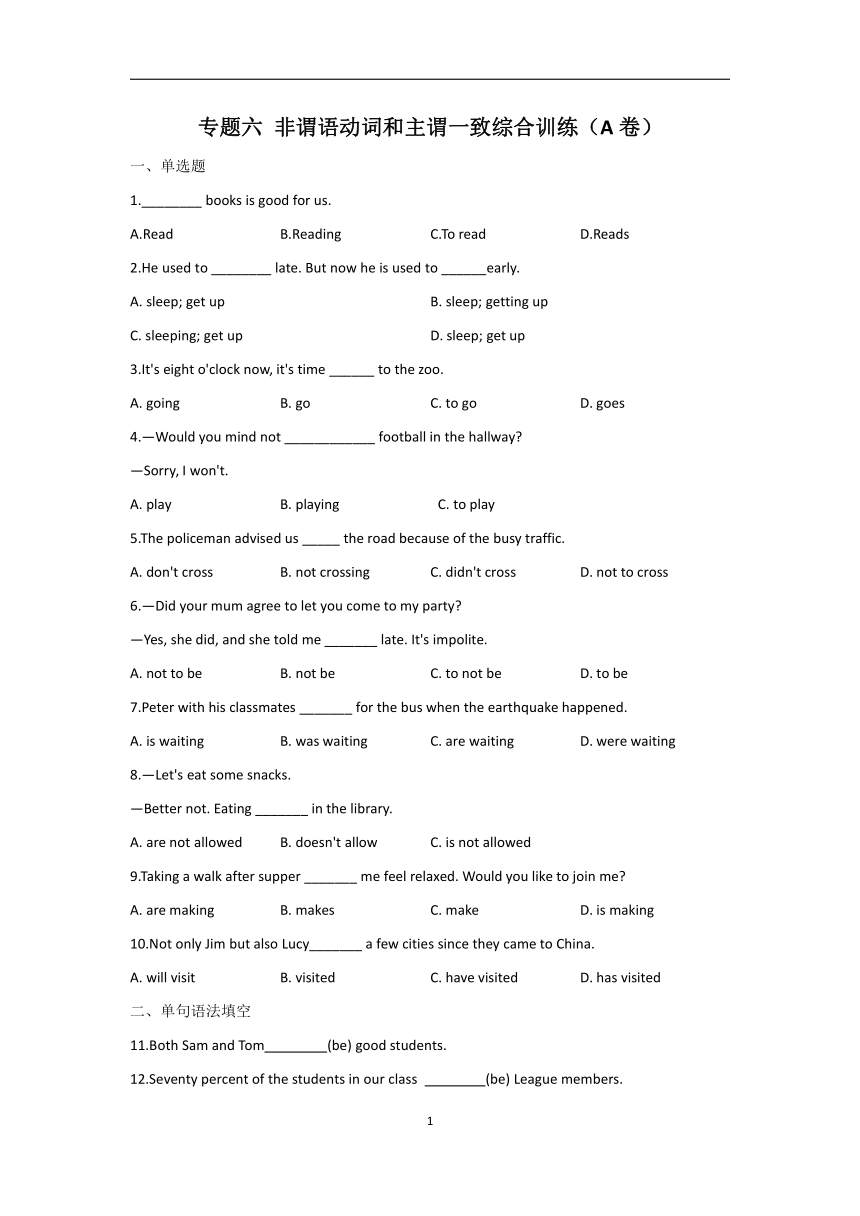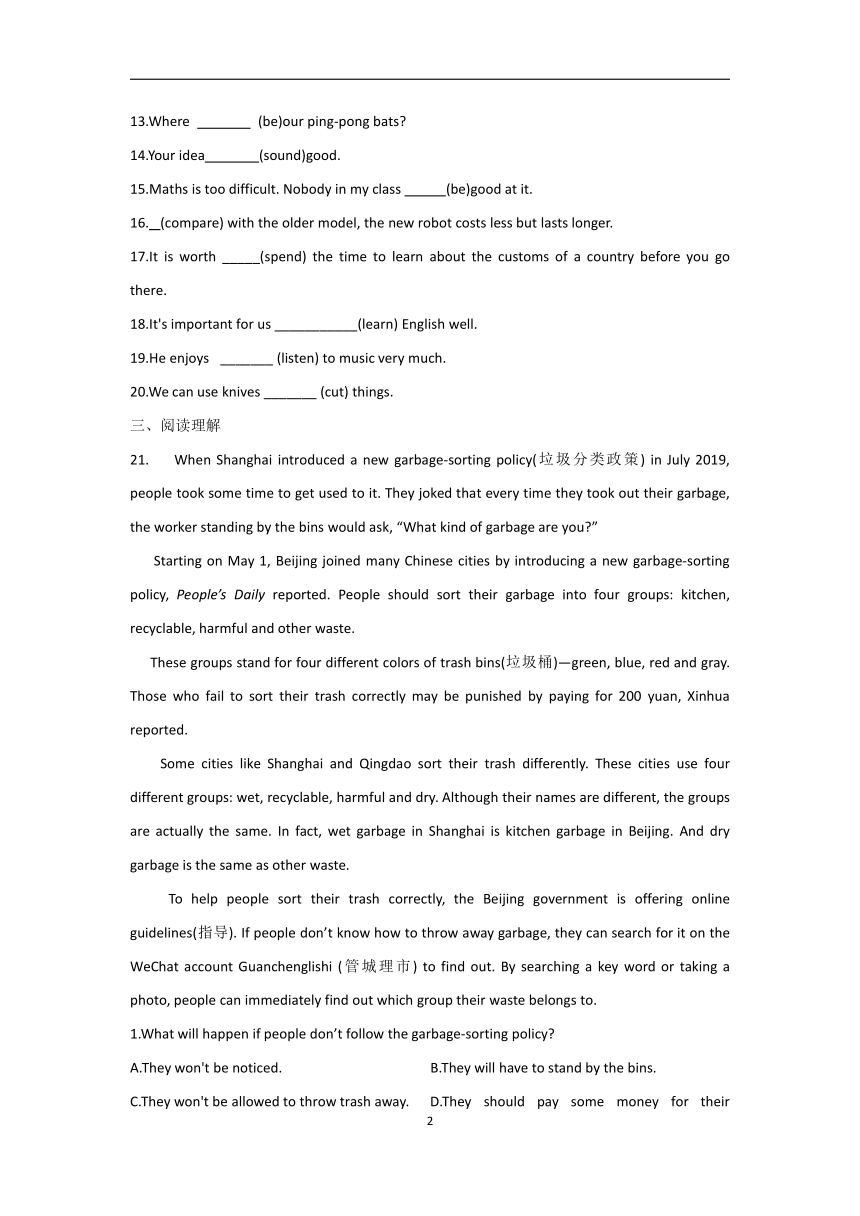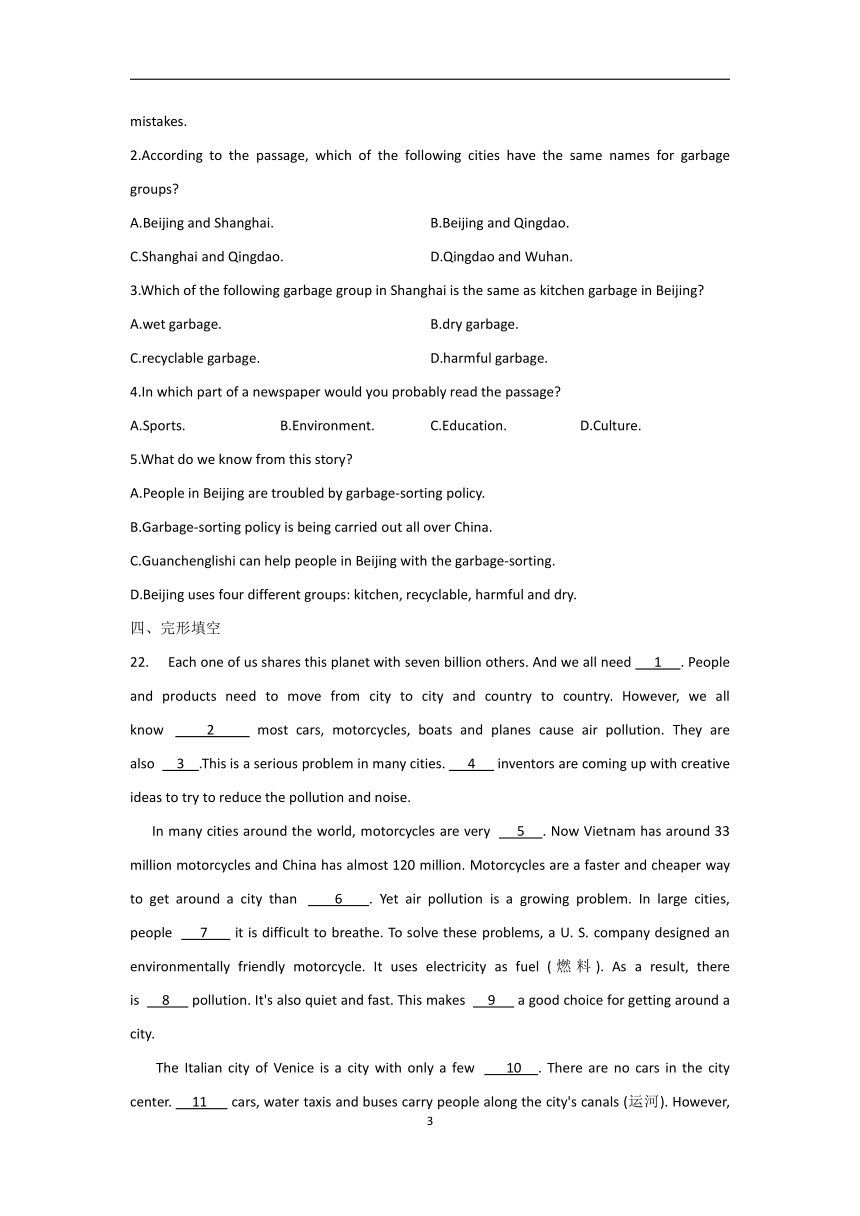2023年中考英语一轮复习专项练习:专题六 非谓语动词和主谓一致综合训练(A卷)(含解析)
文档属性
| 名称 | 2023年中考英语一轮复习专项练习:专题六 非谓语动词和主谓一致综合训练(A卷)(含解析) |

|
|
| 格式 | doc | ||
| 文件大小 | 27.4KB | ||
| 资源类型 | 教案 | ||
| 版本资源 | 通用版 | ||
| 科目 | 英语 | ||
| 更新时间 | 2022-12-25 00:00:00 | ||
图片预览



文档简介
专题六 非谓语动词和主谓一致综合训练(A卷)
一、单选题
1.________ books is good for us.
A.Read B.Reading C.To read D.Reads
2.He used to ________ late. But now he is used to ______early.
A. sleep; get up B. sleep; getting up
C. sleeping; get up D. sleep; get up
3.It's eight o'clock now, it's time ______ to the zoo.
A. going B. go C. to go D. goes
4.—Would you mind not ____________ football in the hallway
—Sorry, I won't.
A. play B. playing C. to play
5.The policeman advised us _____ the road because of the busy traffic.
A. don't cross B. not crossing C. didn't cross D. not to cross
6.—Did your mum agree to let you come to my party
—Yes, she did, and she told me _______ late. It's impolite.
A. not to be B. not be C. to not be D. to be
7.Peter with his classmates _______ for the bus when the earthquake happened.
A. is waiting B. was waiting C. are waiting D. were waiting
8.—Let's eat some snacks.
—Better not. Eating _______ in the library.
A. are not allowed B. doesn't allow C. is not allowed
9.Taking a walk after supper _______ me feel relaxed. Would you like to join me
A. are making B. makes C. make D. is making
10.Not only Jim but also Lucy_______ a few cities since they came to China.
A. will visit B. visited C. have visited D. has visited
二、单句语法填空
11.Both Sam and Tom (be) good students.
12.Seventy percent of the students in our class (be) League members.
13.Where (be)our ping-pong bats
14.Your idea (sound)good.
15.Maths is too difficult. Nobody in my class (be)good at it.
16. (compare) with the older model, the new robot costs less but lasts longer.
17.It is worth _____(spend) the time to learn about the customs of a country before you go there.
18.It's important for us ___________(learn) English well.
19.He enjoys _______ (listen) to music very much.
20.We can use knives _______ (cut) things.
三、阅读理解
21. When Shanghai introduced a new garbage-sorting policy(垃圾分类政策) in July 2019, people took some time to get used to it. They joked that every time they took out their garbage, the worker standing by the bins would ask, “What kind of garbage are you ”
Starting on May 1, Beijing joined many Chinese cities by introducing a new garbage-sorting policy, People’s Daily reported. People should sort their garbage into four groups: kitchen, recyclable, harmful and other waste.
These groups stand for four different colors of trash bins(垃圾桶)—green, blue, red and gray. Those who fail to sort their trash correctly may be punished by paying for 200 yuan, Xinhua reported.
Some cities like Shanghai and Qingdao sort their trash differently. These cities use four different groups: wet, recyclable, harmful and dry. Although their names are different, the groups are actually the same. In fact, wet garbage in Shanghai is kitchen garbage in Beijing. And dry garbage is the same as other waste.
To help people sort their trash correctly, the Beijing government is offering online guidelines(指导). If people don’t know how to throw away garbage, they can search for it on the WeChat account Guanchenglishi (管城理市) to find out. By searching a key word or taking a photo, people can immediately find out which group their waste belongs to.
1.What will happen if people don’t follow the garbage-sorting policy
A.They won't be noticed. B.They will have to stand by the bins.
C.They won't be allowed to throw trash away. D.They should pay some money for their mistakes.
2.According to the passage, which of the following cities have the same names for garbage groups
A.Beijing and Shanghai. B.Beijing and Qingdao.
C.Shanghai and Qingdao. D.Qingdao and Wuhan.
3.Which of the following garbage group in Shanghai is the same as kitchen garbage in Beijing
A.wet garbage. B.dry garbage.
C.recyclable garbage. D.harmful garbage.
4.In which part of a newspaper would you probably read the passage
A.Sports. B.Environment. C.Education. D.Culture.
5.What do we know from this story
A.People in Beijing are troubled by garbage-sorting policy.
B.Garbage-sorting policy is being carried out all over China.
C.Guanchenglishi can help people in Beijing with the garbage-sorting.
D.Beijing uses four different groups: kitchen, recyclable, harmful and dry.
四、完形填空
22. Each one of us shares this planet with seven billion others. And we all need 1 . People and products need to move from city to city and country to country. However, we all know 2 most cars, motorcycles, boats and planes cause air pollution. They are also 3 .This is a serious problem in many cities. 4 inventors are coming up with creative ideas to try to reduce the pollution and noise.
In many cities around the world, motorcycles are very 5 . Now Vietnam has around 33 million motorcycles and China has almost 120 million. Motorcycles are a faster and cheaper way to get around a city than 6 . Yet air pollution is a growing problem. In large cities, people 7 it is difficult to breathe. To solve these problems, a U. S. company designed an environmentally friendly motorcycle. It uses electricity as fuel (燃料). As a result, there is 8 pollution. It's also quiet and fast. This makes 9 a good choice for getting around a city.
The Italian city of Venice is a city with only a few 10 . There are no cars in the city center. 11 cars, water taxis and buses carry people along the city's canals (运河). However, they cause pollution. 12 to the water. English engineers Dick and Jem designed a solar-powered (太阳能) water taxi. The water taxi 13 run for a day after being recharged (充电).
Planes also cause air and noise pollution. Designing an environmentally friendly airplane is a real 14 . Some airplane companies have 15 to solve the problems. Swiss engineers have gone one step further. They developed a solar airplane. This plane holds the world record for the longest solar-powered flight—1541 kilometers from Arizona to Texas in America.
1.A.air B.food C.transportation D.communication
2.A.how B.why C.when D.that
3.A.noisy B.dirty C.fast D.expensive
4.A.Since B.So C.Because D.Although
5.A.popular B.valuable C.dangerous D.safe
6.A.bikes B.subways C.buses D.cars
7.A.explain B.complain C.doubt D.promise
8.A.much B.some C.no D.more
9.A.them B.you C.us D.it
10.A.rivers B.roads C.tourists D.people
11.A.Instead of B.Thanks to C.Because of D.As for
12.A.probably B.only C.especially D.hardly
13.A.must B.can C.should D.need
14.A.question B.job C.decision D.challenge
15.A.disagreed B.refused C.started D.remembered
答案以及解析
一、单选题
1.答案:B
2.答案:B
3.答案:C
4.答案:B
解析:本题考查动名词的用法。mind后若跟动词,应用其动名词形式。mind not doing sth.意为"介意不做某事"。
5.答案:D
解析:advise sb. (not) to do sth. 意为“建议某人(不要)做某事”。故选D。
6.答案:A
7.答案:B
解析:当主语中有with时,谓语动词应与with前的主语保持一致,且根据happened可知,此处应用过去进行时。故选B项。
8.答案:C
解析:本题考查被动语态和主谓一致。Eating与allow之间为被动关系, 应用被动语态, 且Eating作主语时, 谓语动词用第三人称单数形式, 故应用is not allowed。
9.答案:B
10.答案:D
解析:考查动词时态和主谓一致。will visit般将来时; visited一般过去时; have visited现在完成时; has visited现在完成时, has是have的第三人称单数形式。根据句中"since they came to China。"可知, 这里表示从过去持续到现在的动作, 应用现在完成时态, 排除A和B。主是Not only Jim but also Lucy谓语动词应根据就近原则, 与Lucy一致, 助动词用has故选D。
二、单句语法填空
11.答案:are
12.答案:are
13.答案:are
14.答案:sounds
15.答案:is
16.答案:Compared
17.答案:spending
18.答案:to learn
19.答案:listening
解析:句意为:他非常喜欢听音乐。 enjoy doing sth意为"喜欢做某事"。
20.答案:to cut
解析: use sth to do sth意为"使用某物做某事"。
三、阅读理解
21.答案:1-5 DCABC
解析:1.细节理解题。根据“Those who fail to sort their trash correctly may be punished by paying for 200 yuan, Xinhua reported.”可知,没有按照垃圾分类的政策扔垃圾可能被罚款。故选D。
2.细节理解题。根据“Some cities like Shanghai and Qingdao sort their trash differently. These cities use four different groups: wet, recyclable, harmful and dry. Although their names are different, the groups are actually the same. ”可知,上海和青岛在垃圾分类的分组名字上是相同的。故选C。
3.细节理解题。根据“In fact, wet garbage in Shanghai is kitchen garbage in Beijing.”可知,北京的厨房垃圾就相当于上海的湿垃圾。故选A。
4.推理判断题。根据整个文章的理解可知,主要是介绍垃圾分类的一些情况,应该是在报纸的环境部分能看到,故选B。
5.推理判断题。根据“ If people don’t know how to throw away garbage, they can search for it on the WeChat account Guanchenglishi(管城理市) to find out. By searching a key word or taking a photo, people can immediately find out which group their waste belongs to.”可知, 管城理市可以帮助人们找到怎样扔垃圾,故选C。
四、完形填空
22.答案:1.C; 2.D; 3.A; 4.B; 5.A; 6.D; 7.B; 8.C; 9.D; 10.B; 11.A; 12.C; 13.B; 14.D; 15.C
解析:1.由第一段第三句"People and products need to move from city to city and country to country."可知人们需要"交通"。air空气;food食物;communication沟通。
2.句意:然而,我们都知道大多数的汽车、摩托车、船和飞机都会导致空气污染。本句含有that引导的宾语从句,that在从句中不充当任何成分,故选D项。
3.根据本段最后一句中的"reduce the polluion and noise"可知本题应该选择noisy"吵闹的"。dirty脏的;fast快的;expensive昂贵的。
4.根据前面提到的污染和噪音问题可知,"所以"发明家们正在提出有创意的想法来减少污染和噪音。故选B项。
5.根据下一句句意"现在越南已经有大约33,000,000辆摩托车,中国也有差不多10,000,000辆摩托车。"可知,此处应该选择"受欢迎的",故选A项。valuable有价值的;dangerous危险的;safe安全的。
6.句意:摩托车是一种比汽车(cars)更快而且更便宜的市内出行的方式。bike自行车,subway地铁,bus公交车,都不具备可比性,故选D项。
7.根据上一句,"然而空气污染却成了一个日益严重的问题。"可知在"大城市里,人们抱怨(complain)连呼吸都是困难的。"故选B项。explain解释;doubt怀疑;promise许诺。
8.根据上一句"它是用电作为燃料的",可知"它是没有(no)污染的",much许多;some一些;more更多。
9."make+ it +adj./n."是固定结构。本句意为"对于市内出行,这是一个不错的选择"。them他们;you你,你们;us我们。
10.根据句意"意大利城市威尼斯是一座仅有几条道路的城市",可知应该选择B项。river河流;road道路;tourist游客;people人们。
11. instead of(代替)符合句意。thanks to幸亏,由于;because of因为;as for至于。
12.根据句意"然而,它们引起污染,尤其(especially)对于水造成污染"可知应该选择C项。probably很可能;only仅仅,只;hardly几乎不。
13.根据句意"这种水上出租车在被充电以后,可以(can)运行一天"可知应该选择B项。must必须;should应该;need需要。
14.根据句意"设计一架环保的飞机真是一个挑战(challenge)"可知应该选择D项。question问题;job工作;decision决定。
15.根据句意"一些飞机公司已经开始解决这些问题了"可知应该选择C项。start to do sth.开始做某事。disagree不同意;refuse拒绝;remember记得。
2
一、单选题
1.________ books is good for us.
A.Read B.Reading C.To read D.Reads
2.He used to ________ late. But now he is used to ______early.
A. sleep; get up B. sleep; getting up
C. sleeping; get up D. sleep; get up
3.It's eight o'clock now, it's time ______ to the zoo.
A. going B. go C. to go D. goes
4.—Would you mind not ____________ football in the hallway
—Sorry, I won't.
A. play B. playing C. to play
5.The policeman advised us _____ the road because of the busy traffic.
A. don't cross B. not crossing C. didn't cross D. not to cross
6.—Did your mum agree to let you come to my party
—Yes, she did, and she told me _______ late. It's impolite.
A. not to be B. not be C. to not be D. to be
7.Peter with his classmates _______ for the bus when the earthquake happened.
A. is waiting B. was waiting C. are waiting D. were waiting
8.—Let's eat some snacks.
—Better not. Eating _______ in the library.
A. are not allowed B. doesn't allow C. is not allowed
9.Taking a walk after supper _______ me feel relaxed. Would you like to join me
A. are making B. makes C. make D. is making
10.Not only Jim but also Lucy_______ a few cities since they came to China.
A. will visit B. visited C. have visited D. has visited
二、单句语法填空
11.Both Sam and Tom (be) good students.
12.Seventy percent of the students in our class (be) League members.
13.Where (be)our ping-pong bats
14.Your idea (sound)good.
15.Maths is too difficult. Nobody in my class (be)good at it.
16. (compare) with the older model, the new robot costs less but lasts longer.
17.It is worth _____(spend) the time to learn about the customs of a country before you go there.
18.It's important for us ___________(learn) English well.
19.He enjoys _______ (listen) to music very much.
20.We can use knives _______ (cut) things.
三、阅读理解
21. When Shanghai introduced a new garbage-sorting policy(垃圾分类政策) in July 2019, people took some time to get used to it. They joked that every time they took out their garbage, the worker standing by the bins would ask, “What kind of garbage are you ”
Starting on May 1, Beijing joined many Chinese cities by introducing a new garbage-sorting policy, People’s Daily reported. People should sort their garbage into four groups: kitchen, recyclable, harmful and other waste.
These groups stand for four different colors of trash bins(垃圾桶)—green, blue, red and gray. Those who fail to sort their trash correctly may be punished by paying for 200 yuan, Xinhua reported.
Some cities like Shanghai and Qingdao sort their trash differently. These cities use four different groups: wet, recyclable, harmful and dry. Although their names are different, the groups are actually the same. In fact, wet garbage in Shanghai is kitchen garbage in Beijing. And dry garbage is the same as other waste.
To help people sort their trash correctly, the Beijing government is offering online guidelines(指导). If people don’t know how to throw away garbage, they can search for it on the WeChat account Guanchenglishi (管城理市) to find out. By searching a key word or taking a photo, people can immediately find out which group their waste belongs to.
1.What will happen if people don’t follow the garbage-sorting policy
A.They won't be noticed. B.They will have to stand by the bins.
C.They won't be allowed to throw trash away. D.They should pay some money for their mistakes.
2.According to the passage, which of the following cities have the same names for garbage groups
A.Beijing and Shanghai. B.Beijing and Qingdao.
C.Shanghai and Qingdao. D.Qingdao and Wuhan.
3.Which of the following garbage group in Shanghai is the same as kitchen garbage in Beijing
A.wet garbage. B.dry garbage.
C.recyclable garbage. D.harmful garbage.
4.In which part of a newspaper would you probably read the passage
A.Sports. B.Environment. C.Education. D.Culture.
5.What do we know from this story
A.People in Beijing are troubled by garbage-sorting policy.
B.Garbage-sorting policy is being carried out all over China.
C.Guanchenglishi can help people in Beijing with the garbage-sorting.
D.Beijing uses four different groups: kitchen, recyclable, harmful and dry.
四、完形填空
22. Each one of us shares this planet with seven billion others. And we all need 1 . People and products need to move from city to city and country to country. However, we all know 2 most cars, motorcycles, boats and planes cause air pollution. They are also 3 .This is a serious problem in many cities. 4 inventors are coming up with creative ideas to try to reduce the pollution and noise.
In many cities around the world, motorcycles are very 5 . Now Vietnam has around 33 million motorcycles and China has almost 120 million. Motorcycles are a faster and cheaper way to get around a city than 6 . Yet air pollution is a growing problem. In large cities, people 7 it is difficult to breathe. To solve these problems, a U. S. company designed an environmentally friendly motorcycle. It uses electricity as fuel (燃料). As a result, there is 8 pollution. It's also quiet and fast. This makes 9 a good choice for getting around a city.
The Italian city of Venice is a city with only a few 10 . There are no cars in the city center. 11 cars, water taxis and buses carry people along the city's canals (运河). However, they cause pollution. 12 to the water. English engineers Dick and Jem designed a solar-powered (太阳能) water taxi. The water taxi 13 run for a day after being recharged (充电).
Planes also cause air and noise pollution. Designing an environmentally friendly airplane is a real 14 . Some airplane companies have 15 to solve the problems. Swiss engineers have gone one step further. They developed a solar airplane. This plane holds the world record for the longest solar-powered flight—1541 kilometers from Arizona to Texas in America.
1.A.air B.food C.transportation D.communication
2.A.how B.why C.when D.that
3.A.noisy B.dirty C.fast D.expensive
4.A.Since B.So C.Because D.Although
5.A.popular B.valuable C.dangerous D.safe
6.A.bikes B.subways C.buses D.cars
7.A.explain B.complain C.doubt D.promise
8.A.much B.some C.no D.more
9.A.them B.you C.us D.it
10.A.rivers B.roads C.tourists D.people
11.A.Instead of B.Thanks to C.Because of D.As for
12.A.probably B.only C.especially D.hardly
13.A.must B.can C.should D.need
14.A.question B.job C.decision D.challenge
15.A.disagreed B.refused C.started D.remembered
答案以及解析
一、单选题
1.答案:B
2.答案:B
3.答案:C
4.答案:B
解析:本题考查动名词的用法。mind后若跟动词,应用其动名词形式。mind not doing sth.意为"介意不做某事"。
5.答案:D
解析:advise sb. (not) to do sth. 意为“建议某人(不要)做某事”。故选D。
6.答案:A
7.答案:B
解析:当主语中有with时,谓语动词应与with前的主语保持一致,且根据happened可知,此处应用过去进行时。故选B项。
8.答案:C
解析:本题考查被动语态和主谓一致。Eating与allow之间为被动关系, 应用被动语态, 且Eating作主语时, 谓语动词用第三人称单数形式, 故应用is not allowed。
9.答案:B
10.答案:D
解析:考查动词时态和主谓一致。will visit般将来时; visited一般过去时; have visited现在完成时; has visited现在完成时, has是have的第三人称单数形式。根据句中"since they came to China。"可知, 这里表示从过去持续到现在的动作, 应用现在完成时态, 排除A和B。主是Not only Jim but also Lucy谓语动词应根据就近原则, 与Lucy一致, 助动词用has故选D。
二、单句语法填空
11.答案:are
12.答案:are
13.答案:are
14.答案:sounds
15.答案:is
16.答案:Compared
17.答案:spending
18.答案:to learn
19.答案:listening
解析:句意为:他非常喜欢听音乐。 enjoy doing sth意为"喜欢做某事"。
20.答案:to cut
解析: use sth to do sth意为"使用某物做某事"。
三、阅读理解
21.答案:1-5 DCABC
解析:1.细节理解题。根据“Those who fail to sort their trash correctly may be punished by paying for 200 yuan, Xinhua reported.”可知,没有按照垃圾分类的政策扔垃圾可能被罚款。故选D。
2.细节理解题。根据“Some cities like Shanghai and Qingdao sort their trash differently. These cities use four different groups: wet, recyclable, harmful and dry. Although their names are different, the groups are actually the same. ”可知,上海和青岛在垃圾分类的分组名字上是相同的。故选C。
3.细节理解题。根据“In fact, wet garbage in Shanghai is kitchen garbage in Beijing.”可知,北京的厨房垃圾就相当于上海的湿垃圾。故选A。
4.推理判断题。根据整个文章的理解可知,主要是介绍垃圾分类的一些情况,应该是在报纸的环境部分能看到,故选B。
5.推理判断题。根据“ If people don’t know how to throw away garbage, they can search for it on the WeChat account Guanchenglishi(管城理市) to find out. By searching a key word or taking a photo, people can immediately find out which group their waste belongs to.”可知, 管城理市可以帮助人们找到怎样扔垃圾,故选C。
四、完形填空
22.答案:1.C; 2.D; 3.A; 4.B; 5.A; 6.D; 7.B; 8.C; 9.D; 10.B; 11.A; 12.C; 13.B; 14.D; 15.C
解析:1.由第一段第三句"People and products need to move from city to city and country to country."可知人们需要"交通"。air空气;food食物;communication沟通。
2.句意:然而,我们都知道大多数的汽车、摩托车、船和飞机都会导致空气污染。本句含有that引导的宾语从句,that在从句中不充当任何成分,故选D项。
3.根据本段最后一句中的"reduce the polluion and noise"可知本题应该选择noisy"吵闹的"。dirty脏的;fast快的;expensive昂贵的。
4.根据前面提到的污染和噪音问题可知,"所以"发明家们正在提出有创意的想法来减少污染和噪音。故选B项。
5.根据下一句句意"现在越南已经有大约33,000,000辆摩托车,中国也有差不多10,000,000辆摩托车。"可知,此处应该选择"受欢迎的",故选A项。valuable有价值的;dangerous危险的;safe安全的。
6.句意:摩托车是一种比汽车(cars)更快而且更便宜的市内出行的方式。bike自行车,subway地铁,bus公交车,都不具备可比性,故选D项。
7.根据上一句,"然而空气污染却成了一个日益严重的问题。"可知在"大城市里,人们抱怨(complain)连呼吸都是困难的。"故选B项。explain解释;doubt怀疑;promise许诺。
8.根据上一句"它是用电作为燃料的",可知"它是没有(no)污染的",much许多;some一些;more更多。
9."make+ it +adj./n."是固定结构。本句意为"对于市内出行,这是一个不错的选择"。them他们;you你,你们;us我们。
10.根据句意"意大利城市威尼斯是一座仅有几条道路的城市",可知应该选择B项。river河流;road道路;tourist游客;people人们。
11. instead of(代替)符合句意。thanks to幸亏,由于;because of因为;as for至于。
12.根据句意"然而,它们引起污染,尤其(especially)对于水造成污染"可知应该选择C项。probably很可能;only仅仅,只;hardly几乎不。
13.根据句意"这种水上出租车在被充电以后,可以(can)运行一天"可知应该选择B项。must必须;should应该;need需要。
14.根据句意"设计一架环保的飞机真是一个挑战(challenge)"可知应该选择D项。question问题;job工作;decision决定。
15.根据句意"一些飞机公司已经开始解决这些问题了"可知应该选择C项。start to do sth.开始做某事。disagree不同意;refuse拒绝;remember记得。
2
同课章节目录
- 词法
- 名词
- 动词和动词短语
- 动词语态
- 动词时态
- 助动词和情态动词
- 非谓语动词
- 冠词
- 代词
- 数词和量词
- 形容词副词及其比较等级
- 介词和介词短语
- 连词和感叹词
- 构词法
- 相似、相近词比较
- 句法
- 陈述句
- 一般疑问句和否定疑问句
- 特殊疑问句及选择疑问句
- 反意疑问句
- 存在句(There be句型)
- 宾语从句
- 定语从句
- 状语从句
- 主谓一致问题
- 简单句
- 并列句
- 复合句
- 主谓一致
- 主、表语从句
- 名词性从句
- 直接引语和间接引语
- 虚拟语气
- 感叹句
- 强调句
- 倒装句
- 祈使句
- 句子的成分
- 句子的分类
- 题型专区
- 单项选择部分
- 易错题
- 完形填空
- 阅读理解
- 词汇练习
- 听说训练
- 句型转换
- 补全对话
- 短文改错
- 翻译
- 书面表达
- 任务型阅读
- 语法填空
- 其他资料
